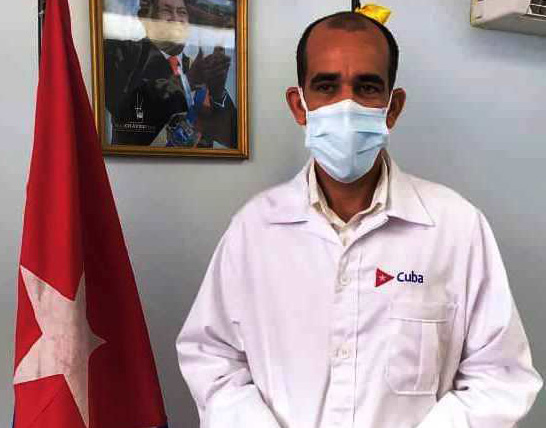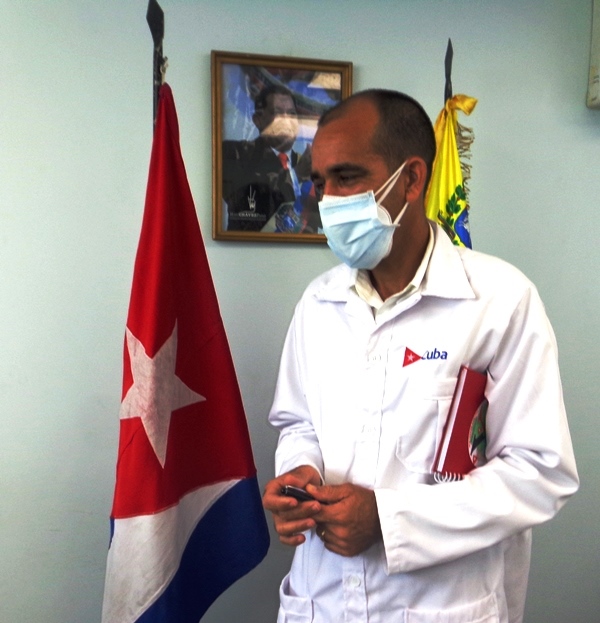
Although he lives in the town of Maniabón and works at the Guillermo Domínguez hospital in Puerto Padre, places that I visit very frequently, Dr. Máikel Fernández López, a First Degree specialist in Intensive and Emergency Medicine, I met him in Caracas.
He had already provided his solidarity services in the Homeland of Bolívar, “I was from 2007 to 2012 fulfilling an internationalist mission in the State of Bolívar,” he remembers and considers it a strength, because “one knows the customs, the traditions of the people, and that helps a lot in performance.”
He arrived again in Venezuela on September 11 of last year, when the COVID-19 was spreading voraciously throughout the country, and he did so at the head of the 44th Brigade of the Henry Reeve International Contingent of Specialized Doctors in Disaster Situations and Serious Epidemics, who from Caracas provided support in the care of positive cases in six other neighboring states.
On that date, six Cuban brigades arrived with more than 90 professionals in various health specialties and each one served several States grouped into regions and in this way covered the entire nation.
The arrival of the experts refreshed the panorama of a health force, then with more than 180 days of constant confrontation with the disease, which generates natural exhaustion.

- How was the Caracas brigade integrated?
"It was made up of 16 professionals, including specialists in Intensive Care, Anesthesiology, Nephrology, Pulmonology, Cardiology, Hygiene and Epidemiology, and five Nursing graduates, all with a high scientific knowledge of the task, many of them had already participated in other brigades of the" Henry Reeve "in the confrontation with Ebola, in Africa; and, against this pandemic in different regions of Europe such as Lombardy, Crema and Turin.
Almost all the country's provinces were represented in the group, but Las Tunas predominates with six members: Idania Tamayo Batista (city of Las Tunas); Manuel Benito Vázquez Góngora ("Colombia"); and the intensive care nurses Eduardo Brito Pérez (city of Las Tunas); Norberto Pena Peña (Puerto Padre) and Luis Orlando Feria Cabello (Puerto Padre).
-How did they organize the work?
We came to join the Cuban Medical Mission in Venezuela to specifically attend to collaborators affected by COVID-19 and to nationals who for that reason will need our services.
The job consisted of working on counseling and caring for confirmed COVID-19 patients. Some of our colleagues were in red zones for days.
Daily, we visited the planned comprehensive diagnostic centers. We arrived at the edge of 9:00 in the morning after the doctors in the red zone had evolved and had a diagnosis of the condition of the patients to evaluate each case and make collective behavior and decisions."
-What did this mission mean?
"A great experience full of risks, challenges, it is very complex and exhausting to stay so long with the diving suits that we put on to avoid contagion, but one feels pride in what one does."
-Do you feel responsible for the life and health of Cuban collaborators?
Although my specialty is caring for seriously ill patients, when you leave the country and find yourself thousands of miles away, seeing a sick compatriot is like seeing a brother, because we are all one big family, and when you find him struggling for the life you grow and you draw strength from where you don't have it and you feed a decision, no one can die under my care and that was our goal. Fortunately, we had no deaths since our arrival.
We saved 10 Cuban lives and returned happiness to those families. The satisfaction of attending to our compatriots in critical condition is great and then seeing them walking, talking, already recovered; Then, we realize that the sacrifice was worth it because those are the values instilled by the Revolution, our Commander in Chief and President Miguel Díaz-Canel, which exalt solidarity, human sentiments, internationalism, patriotism."
Dr. Máikel Fernández López returned to the homeland and as the worthy founder of the contingent, Henry Reeve imagined him in his native Puerto Padre, after complying with the biosafety protocols, fighting in a continuing fight now against the outbreak of the pandemic.